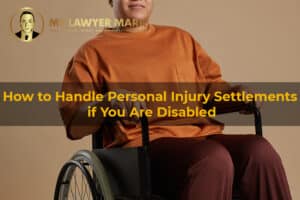How to Handle Personal Injury Settlements if You Are Disabled
 Dealing with a personal injury settlement can be challenging, but it becomes even more complicated when you are disabled. Understanding how to handle personal injury settlements if you are disabled requires careful planning, legal expertise, and knowledge of how disability benefits, medical care, and legal processes interact. This guide will walk you through the essential steps, highlight common pitfalls, and provide tips to maximize your settlement.
Dealing with a personal injury settlement can be challenging, but it becomes even more complicated when you are disabled. Understanding how to handle personal injury settlements if you are disabled requires careful planning, legal expertise, and knowledge of how disability benefits, medical care, and legal processes interact. This guide will walk you through the essential steps, highlight common pitfalls, and provide tips to maximize your settlement.
How to Handle Personal Injury Settlements if You Are Disabled in California
Why Hiring a Personal Injury Lawyer in California Is Essential
If you’re pursuing a personal injury settlement while managing a disability, navigating the legal system alone can feel overwhelming. This is where a personal injury lawyer in California comes in. These legal professionals understand the nuances of state and federal laws that apply to personal injury cases and disability benefits.
For instance, your lawyer can help ensure that your settlement is structured to avoid jeopardizing government benefits like Social Security Disability Insurance (SSDI) or Supplemental Security Income (SSI). They can also fight for compensation that covers the long-term costs of living with a disability, including ongoing medical care, assistive devices, and home modifications.
Steps to Handle Personal Injury Settlements if You Are Disabled
1. Assess the Full Scope of Your Damages
The first step in how to handle personal injury settlements if you are disabled is to evaluate all your damages. This includes:
- Economic Damages: Medical bills, lost wages, and any expenses related to your disability, such as assistive devices or in-home care.
- Non-Economic Damages: Pain and suffering, emotional distress, and loss of enjoyment of life. These are often subjective and require legal expertise to quantify accurately.
- Future Costs: If your disability is permanent or long-term, you need to account for future medical expenses and reduced earning capacity.
A personal injury lawyer in California can help you calculate the true value of your claim to ensure you don’t settle for less than you deserve.
2. Protect Your Government Benefits
One critical aspect of managing a settlement while disabled is safeguarding your eligibility for government benefits like SSI, Medicaid, or housing assistance. Since these programs have strict income and asset limits, receiving a large settlement could inadvertently disqualify you.
Your lawyer can set up a Special Needs Trust (SNT) or other legal tools to hold your settlement funds without affecting your benefits. This strategy allows you to use your settlement for necessary expenses while remaining eligible for government aid.
3. Document Your Injury and Disability
Detailed documentation is crucial in personal injury cases, especially when a disability is involved. Keep records of:
- Medical diagnoses and treatments
- Physical therapy or rehabilitation
- Specialist consultations
- Home modifications or equipment purchases
- Testimonies from doctors or therapists about your condition and prognosis
This evidence strengthens your case and helps your lawyer negotiate a fair settlement.
4. Negotiate for Fair Compensation
Insurance companies often attempt to minimize settlements, particularly for disabled claimants. They may argue that some costs were pre-existing or unrelated to the injury. A skilled lawyer from My Lawyer Mark can counter these tactics by providing robust evidence and negotiating aggressively on your behalf.
5. Avoid Common Pitfalls
When learning how to handle personal injury settlements if you are disabled, avoid these common mistakes:
- Accepting a Low Initial Offer: Insurance companies may present a quick but inadequate settlement. Consult your lawyer before accepting any offer.
- Ignoring Tax Implications: While many personal injury settlements are tax-free, portions allocated for punitive damages or lost wages may be taxable. Your lawyer can guide you on this.
- Not Planning for Future Costs: Failing to consider long-term expenses can leave you struggling financially down the line.
FAQs About Personal Injury Settlements for Disabled Individuals
Can I Still File a Claim if I Had a Pre-Existing Disability?
Yes! A pre-existing disability doesn’t disqualify you from pursuing a personal injury claim. However, you’ll need to prove that the defendant’s actions aggravated your condition or caused additional harm. A personal injury lawyer in California can help you build a strong case.
How Long Will My Settlement Take?
Settlement timelines vary depending on the complexity of your case, the willingness of the opposing party to negotiate, and court schedules. However, an experienced attorney can expedite the process by handling negotiations and paperwork efficiently.
What Happens if My Case Goes to Trial?
While most cases settle out of court, some may go to trial. If this happens, your lawyer will represent you in court, presenting evidence to prove the defendant’s liability and the extent of your damages.
Choose Wisely: Choose My Lawyer Mark
At My Lawyer Mark, we understand the unique challenges faced by disabled individuals pursuing personal injury settlements. Our experienced lawyers specialize in maximizing compensation while protecting your eligibility for disability benefits. With our personalized approach, we’ll work tirelessly to ensure you receive the justice and financial support you deserve.
Hiring a lawyer who knows how to handle personal injury settlements if you are disabled can make a significant difference in the outcome of your case. Don’t navigate this complex process alone. Contact My Lawyer Mark at (866) 721-5808 to speak with an experienced attorney who will fight for your rights and ensure you get the compensation you deserve.
